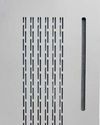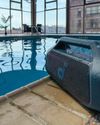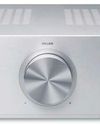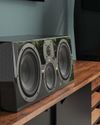Texas Instruments’ new chip has enthusiasts asking that question.

Texas Instruments has upped the DLP game with the recent rollout of their newest digital micro mirror device DMD), claiming full Ultra HD performance. The 0.66-inch chip has nearly the same physical dimensions as the DLP chip found today in many 1080p home theater and business application projectors. It features a native resolution of 2716 x 1528 pixels, which combined with an optical actuator used for pixel shifting, allows for an onscreen image of 8.3 million pixels—roughly the same as a native 3840 x 2160 UHD imaging chip. The chip’s compact size is said to allow for more cost-effective manufacturing—and has resulted in a new $2,000 low price point for at least one Optoma 4K projector.
How’s It Work?
Both TI and manufacturers implementing the chip call the result a true 4K image despite the lower native resolution on the DMD and its inability to deliver all the pixels of an Ultra HD frame at one time. The pixel-shifting approach employed here is similar to the solutions used over the years by JVC and more recently by Epson, both of which involve native 1920 x 1080 (1080p) imaging chips that are then doubled onscreen via an optical actuator to deliver “4K-like” images without the expense of true 4K native imaging chips. Old-timers may recall that the first 1080p DLP devices— notably those used in rear-projection TVs from the likes of Hewlett-Packard and Samsung around 2007—also achieved their claimed resolution with the assistance of pixel shifting. Conceptually, the very rapid, consecutive delivery of two half-frames of video, with the second set of pixels shifted vertically and horizontally so they overlap, is seen by the eye as a single frame.
This story is from the {{IssueName}} edition of {{MagazineName}}.
Start your 7-day Magzter GOLD free trial to access thousands of curated premium stories, and 9,000+ magazines and newspapers.
Already a subscriber ? Sign In
This story is from the {{IssueName}} edition of {{MagazineName}}.
Start your 7-day Magzter GOLD free trial to access thousands of curated premium stories, and 9,000+ magazines and newspapers.
Already a subscriber? Sign In

The Big Clean
Chances are you probably do not think about the state of your electronic devices too often. Oh, you might think about all the upgrades you would like to make; where you would put those new tower speakers, or how a second or third subwoofer would really tame those bass modes in your room, or how much more cinematic a larger screen would be. Sure, you think about that part of your system. But how often do you think about the well-being of your system?

Planar-Magnetic Attraction
THE DIPTYQUE DP 115 speakers are a new model 2-way, ribbon, and planar magnetic driver dipole \"isodynamic\" speaker system designed and built in France.

Full-Featured 4K
THE QN95D is one of two televisions we went hands-on with on a recent trip to Samsung's New Jersey QA Lab, the other being the S95D quantum-dot OLED.

Party Animal
FOR ANY party, the Soundcore Boom 2 Plus Outdoor Bass Bluetooth Speaker is an essential invite.

It's the End of the World. How About Popcorn and a Movie?
Attention all preppers! Today's column is right up your alley-or, more precisely-your tunnel to your underground bunker.

Bridging the Analog-Digital Gap on a Recliner
When I shopped for a motorized recliner, I rejected models with their own Internet Protocol address and built-in speakers. No need. I had already placed a smart speaker on an étagère beside the space where I had planned to put the chair. I'd have a smartphone in my hand and the room would be bathed in Wi-Fi.

BACK TO THE GARDEN
AN AQUARIAN EXPOSITION in WHITE LAKE, N.Y.

Big Sound, Small Price
DOLBY ATMOS, once a costly premium, is enjoying a surge of popularity across a range of new audio gear.

Classic Sound with Streaming Smarts
THE TWENTIETH century had its Roaring Twenties; welcome to the twenty-first's Streaming Twenties.

Stand and Deliver
IT DOESN'T seem all that long ago that SVS first entered the audio scene.